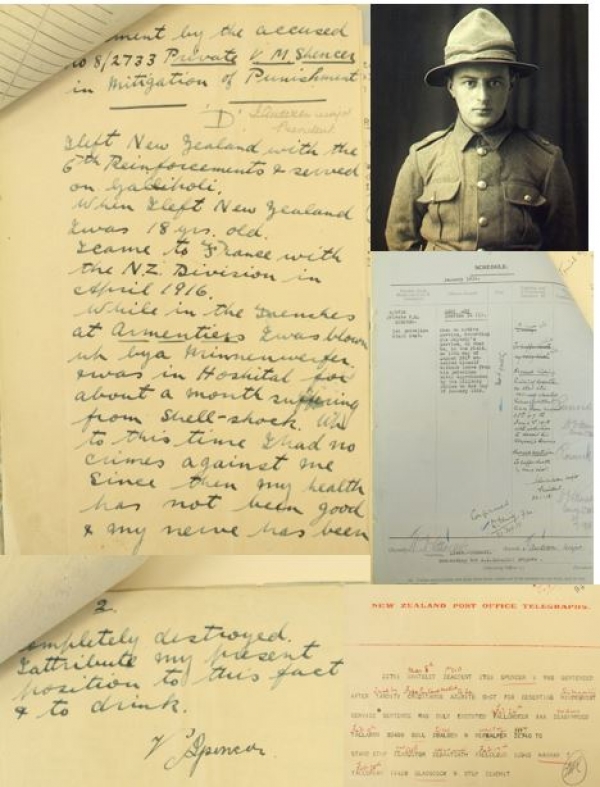The Execution of Victor Manson Spencer
Written by Soldiersandorder NZ-FRWe have been looking at the execution of New Zealand soldiers on the Western Front during the First World War. We have looked at primary documents relating to this. In particular we looked at documents held at the National Archives in Wellington. [Archive File: AD1 767 22.30.74 'Courts martial of Pvt Victor Manson Spencer'.] The photos above show his final plea, his death sentence and the coded telegram back to New Zealand announcing his death.
Victor Manson Spencer was from Otahuhu in Southland and joined the army at the age of 18 years in 1915. He lied about his age and told the army he was 20 years old. He fought the Turks at Gallipoli at the Apex below Chunuk Bair with the 14th Company of the Otago Regiment.
In 1916, he was sent to France, arriving on the front line at Armentières on 21 May 1916. His battalion suffered high casualties during a disastrous raid on German lines in July 1916, resulting in 163 casualties including eight officers. Nevertheless, they remained on the front line for another 32 days without relief. The demands of this prolonged time in the trenches had a negative effect on men. The stress and combat fatigue broke men and many never recovered. After this Spencer went absent a number of times. The stress of going to the front line may have been too much for him. His luck ran out when he was absent from 13 August 1917 until arrested on 2 January 1918. During the time he was absent his unit was supplying parties for wiring and front line trench work, and had been in three offensives: the attacks on 4 and 12 October at Passchendaele and the attacks on Polderhoek Chateau on 3 December 1917. This made his absence a serious offence and his officers gave him no sympathy. He faced a Court Martial to decide what punishment he would receive.
Spencer’s defence was that the physical and mental impacts of war were going unrecognized and underestimated by the authorities. In his statement during his trial, he said “While in the trenches of Armentières I was blown up by a Minenwerfer (Mine launcher) and was in hospital for about a month suffering from shell shock. Up to this time I had no crimes against me. Since then my health has not been good and my nerves have been completely destroyed. I attribute my current position to this fact and to drink”.
The officers at the Court Martial decided that Spencer’s statement did not merit further enquiry nor mitigation of sentence. He was sentenced to death on February 21st 1918 and executed by 24 February 1918 on 6.45 a.m. He is buried at The Huts Cemetery, in Belgium.
Latest from Soldiersandorder NZ-FR
- Shared Histories exhibition posters in Wellington
- Prime Minister John Key with Baradene College Students and Shared Histories exhibition.
- Shared Histories exhibition Opening in Wellington. Baradene College students Olivia Mendonca and Genevieve Bowler with the Governor-General of New Zealand, Sir Jerry Mateparae.
- Our project makes it to Elizabeth II Pukeahu Education Centre [Wellington] launch - wow
- Project becomes an e-book at Auckland Libraries!
